Editor's note: this article is the fourth and last in a series about a pivotal moment in St. Louis's sustainable transportation evolution, and how it mirrors similar moments in other U.S. cities. Click here to read the entire series.
St. Louis's $300-million explosion of sustainable transportation projects and policy initiatives have been making a lot of news in the Gateway to the West. As the city accumulates headline-grabbing grants, though, it's also quietly gaining an army of newly unified advocates who are pushing the city to spend that money right — and becoming a newsworthy phenomenon unto themselves.
On the recent bike tour of those upcoming projects hosted by Mayor Tishaura Jones, one of the largest groups to be invited was the St. Louis Coalition to Protect Cyclists and Pedestrians — or, as they sometimes jokingly refer to themselves, CP2. In addition to gaining the ear of the mayor, the collective has become a frequent feature on local news stations for their creative efforts to push for better policy and design, even in an era of historic investment when other advocates might be taking a victory lap. (Disclosure: as a local advocate myself, I've participated in a number of these events.)
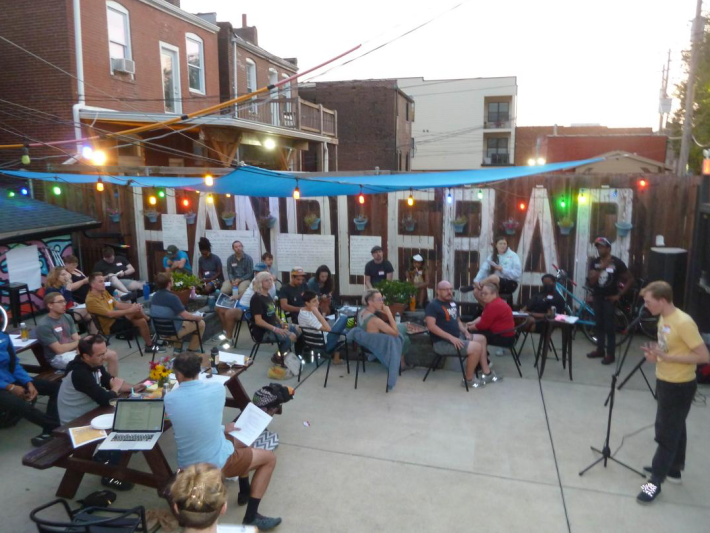
The group's omnipresence might seem unusual for a scrappy, non-hierarchical collective that formed just a few months ago. Considering that the Coalition is, essentially an Avengers-style superhero team of long-standing activists that has push for the changes St. Louis is seeing now, though, it's not really that surprising at all.
Look around any of the group's meetings, and you'll see employees of virtually all of the region's active transportation non-profits, alongside citizen advocates who haven't always been recognized for their quiet but pivotal role in shaping local transportation culture. When CP2 invited all those people to come together as residents, though, they proved to be a force to be reckoned with.
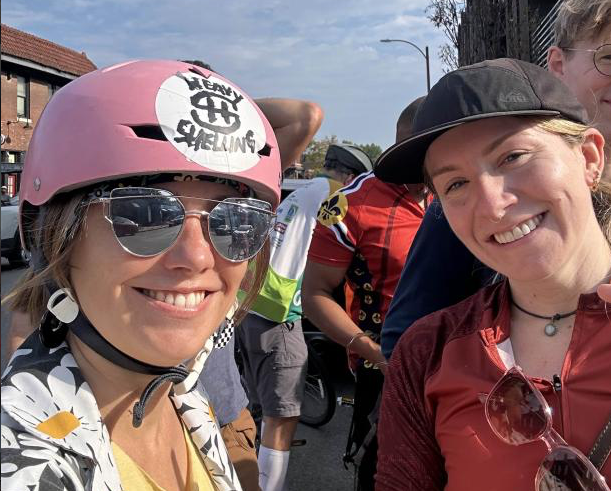
“In St Louis, for whatever reason, all of the different groups that work on transportation and bike and pedestrian safety — and there are many — haven't always worked well with each other," explains Jenn DeRose, one of the Coalition's many co-founders. "What we really need are community activists to lead the way, because we don't have that history, that baggage. Some of us do have technical training. But most of us just have our lived experiences — and that is good enough to push for a better policy.”
The Coalition initially began with DeRose and fellow co-founder Dani Adams, who met while volunteering at a local bike nonprofits, and became friends while pedaling next to each other on one of St. Louis' many local group rides. Adams, a social worker, wanted to "mobilize" the hundreds of people those rides attract for policy change, but wasn't sure when would be the right time; DeRose, an organizer with the Sierra Club, quickly realized this summer's deluge of funding and policy change meant that the right time was now.
"That was just lucky," DeRose said. "And as soon as we realized that all this was happening, it was like, 'Oh snap; we have to move fast.'”
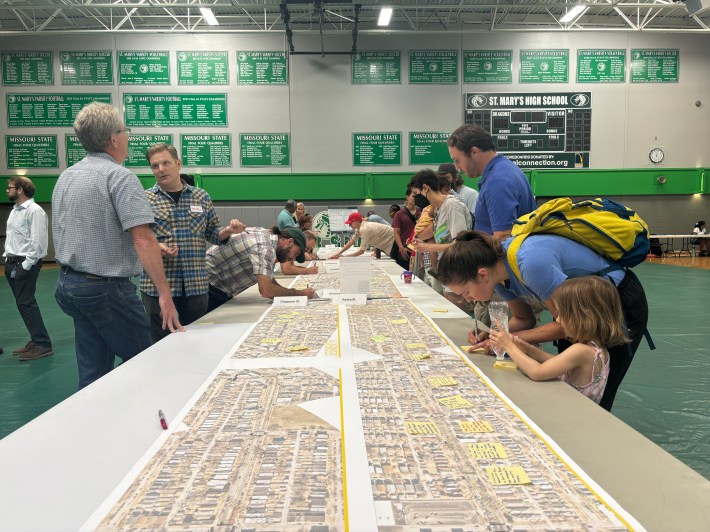
The group started organizing fellow riders to attend the city's many community engagement sessions about upcoming road redesigns, papering over planning firm posterboards with requests for better protected bike lanes and more aggressive lane reductions on fast roads. Then members followed up those efforts with petitions, often hand-delivered to the city by a herd of people on bikes.
It was the kind of bread-and-butter organizing that's common in other U.S. cities, but that St. Louis's disjointed advocacy scene has sometimes struggled to accomplish at scale — and almost immediately, those efforts began to pay off. After the group attended an early open house for the redesign of a key segment of Kingshighway Boulevard, the city agreed to do a better job on the monster stroad that runs through most of the city and is the second-highest crash corridor for people on foot.
To really move the needle, though, the Coalition soon realized it would need to get out in the streets.
“There was all this terminology, like 'road diets' and 'armadillos,'" added Adams. "I'm a social worker; I don't know all these terms! I just know that it feels unsafe to ride on the roads, and that we need something better. … We are all advocates just because we all use the streets. You don't need to attend the formal training; you have enough in your pocket to be an advocate just by having gone on the bike ride, having done the walk. Those are the tools that you need.”
The burgeoning Coalition quickly gained new members — the group counts at least seven people among its "founding committee," and has roughly a hundred active members on its Discord server to date. And that emphasis on lived experience quickly evolved into a strategy.
Whenever the city announced a formal open house to discuss infrastructure changes along a corridor, the group announced an informal bike ride or walk along that same corridor to talk about those changes in real time — often inviting city staff and the local media to tag along.
“One of the things that we've been consistently advocating for is telling designers, telling policymakers, that you need to experience the streets from a pedestrian point of view if you're going to make major changes that are going to affect pedestrians for the next 20 to 40 years," added DeRose. "We heard from several designers [who said things] like, ‘Oh, I drove down this section, so I saw it.’ No, you didn't; you didn't see it unless you walked it. You didn't see unless you biked it, or unless you took the bus.”
And when the feedback period closed, the coalition kept the conversation going.
“Sometimes they only advertise the open houses a week or less than a week in advance, and then they only give us a week to get our feedback back to them," added Adams. "I feel like a lot of times we're doing their job of community engagement.”
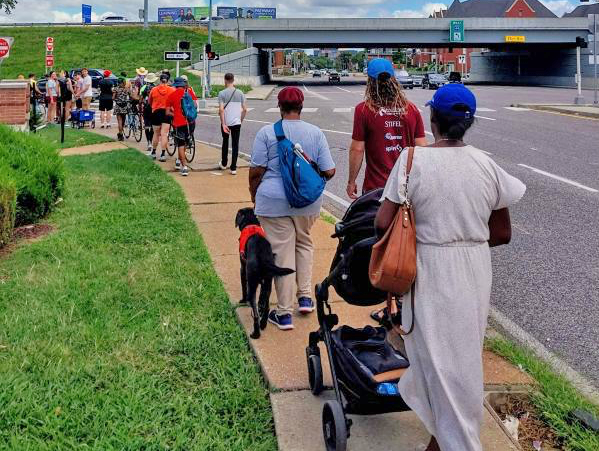
Those mobile community engagement sessions have also doubled as community education, and an opportunity to empower casual commuters to take part in the political process. The Coalition recently began offering regular monthly 'Bike Buses' to City Hall, and special rides to major local events like the annual St. Louis Symphony concert in Forest Park, chatting up riders along the way about the changes coming to their city and how they can get involved.
"You can learn what an armadillo is; you can learn what a road diet is," said Matt Wyczalkowski, another co-founder. "These are not super complex concepts. So for me, I think there is an element of teaching the community about the different aspects of what's happening, and also about bringing together different parts that are having conversations independent of each other.”
One of the few members of the coalition who has a formal engineering background, Wyczalkowski emphasizes that creating community on bikes and foot is just as important as showing up to city hall with a petition for better infrastructure — which the Coalition's bike buses also sometimes do.
“So many walls are broken down, so many conversations are had casually as you ride next to each other for five minutes," he added. "That's a really good way to foster these conversations."
Adams agreed.
“A huge part of the success of the coalition is that we're a community," she added. "We care about each other; we protect each other; we keep each other literally safe on the roads, by blocking [the roads] otherwise. And so I think that that, too, has given us energy; we can do this because we do this, every day for each other.”
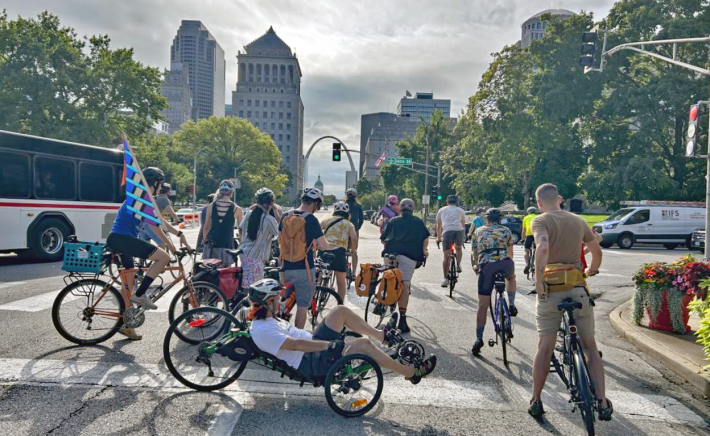
The Coalition founders know that it might not be easy to sustain that energy for the next three years, during which the bulk of St. Louis's $300-million infrastructure commitments are expected to break ground and the new mobility, land-use and zoning plans are all expected to be completed.
The Coalition is already concerned about losing members to burnout, and about growing the coalition beyond the relatively privileged — and usually white — advocates who can afford to volunteer unpaid time to the street safety cause. Founders are trying to deepen their relationships with advocates and leaders from the city's predominantly Black north side, while simultaneously navigating tough conversations with activists who don't always agree with the founders' commitment to non-carceral street safety strategies like infrastructure investment, who want them to push for harsher enforcement, too.
Still, DeRose said that the sheer scale of change coming to St. Louis streets demands that activists persist through those challenges, and keep pressuring transportation leaders to get the details right — and eventually, to make safe transportation projects their new default.
“It’s about forming, storming and norming," she added. "We have formed. We are in the storming phase. Once this is over, we will be in the norming phase. … I want to build the city I want to live in, and I know that everyone else here wants that too. So I think it’s about aiming for that of normalcy, not just with like advocates, but with elected officials, policymakers, designers. I want to see bike and pedestrian safety be a top priority in the future.”






